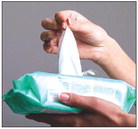Tips for keeping skin looking and feeling healthy
Your skin changes with age. Years of sun tanning or being out in the sunlight for a long time may lead to wrinkles, dryness, age spots, and even cancer. However, there are things you can do to protect your skin that will make it feel and look better.
Dry Skin and Itching
Many people suffer from dry spots on their skin. Dry skin patches feel rough and scaly. There are many possible reasons for dry skin, such as not drinking enough liquids, spending too much time in the sun or sun tanning, smoking, feeling stressed or losing sweat and oil glands, which is common with age. Dry skin also can be caused by health problems, such as diabetes or kidney disease. Talk to your doctor if your skin is very dry and itchy.
Here are two ways to help dry, itchy skin:
• Usemoisturizers,likelotions, creams, or ointments, every day.
• Try using a humidifier, an appliance that adds moisture to a room.
Skin Cancer
Skin cancer is very common in the United States. The main cause of skin cancer is the sun along with sunlamps and tanning booths. Anyone can get skin cancer. People with fair skin that freckles easily are at greatest risk. Skin cancer may be cured if it is found before it spreads to other parts of the body.
There are three types of skin cancers.Basal cell carcinoma and squamous cell carcinoma grow slowly and rarely spread to other parts of the body. These types can grow anywhere but are usually found on parts of the skin most often exposed to the sun, like the head, face, neck, hands, and arms. The third and most dangerous type of skin cancer is melanoma. It is rarer than the other types, but it can spread to other organs and be deadly.
Check your skin once a month for things that may be signs of cancer. Check moles, birthmarks, or other parts of the skin for the 'ABCDE's' A = Asymmetry (one half of the growth looks different from the other half) B = Borders that are irregular C = Color changes or more than one color
D = Diameter greater than the size of a pencil eraser
E =
Evolving; this means the growth changes in size, shape, symptoms (itching, tenderness), surface (especially bleeding), or shades of color See your doctor right away if you have any of these signs to make sure it is not skin cancer.
Keep Your Skin Healthy Some sun can be good for you, but to keep your skin healthy, follow these general practices:
Limit time in the sun.
It's okay to go out during the day, but try to avoid being in sun during peak times when the sun's rays are strongest. For example, during the summer, try to stay out of the sun between 10 a.m. – 4 p.m. Don't be fooled by cloudy skies. The sun's rays can go through clouds. You can also get sunburned if you are in water, so be careful when you are in a pool, lake or the ocean.
Use sunscreen.
Look for sunscreen with an SPF number of 30 or higher. It's best to choose sunscreens with 'broad spectrum' on the label. Put the sunscreen on 15 to 30 minutes before you go outside. Sunscreen should be reapplied at least every two hours. You need to put sunscreen on more often if you are swimming, sweating, or rubbing your skin with a towel.
Wear protective clothing.
A hat with a wide brim can shade your neck, ears, eyes, and head. Look for sunglasses that block 99 to 100 percent of the sun's rays. If you have to be in the sun, wear loose, lightweight, long-sleeved shirts and long pants or long skirts.
Your skin may change with age. But there are things you can do to help. Check your skin often. If you find any changes that worry you, see your doctor.
- www.nia.gov




